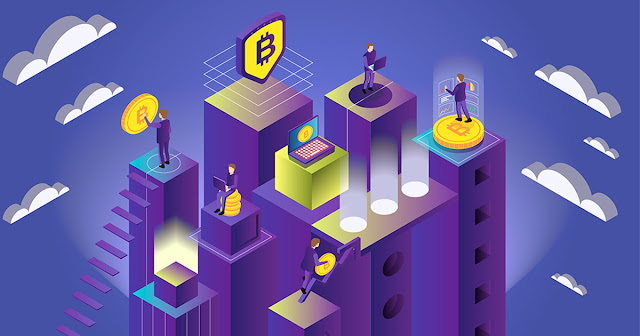Unraveling the Potential: A Comprehensive Guide to Blockchain Application Development
Introduction
What is Blockchain App Development?
Blockchain application development involves creating
decentralized applications (DApps) that leverage blockchain technology. Unlike
traditional applications that rely on a central authority, blockchain apps
operate on a decentralized network of computers, ensuring transparency,
security, and immutability.
How Do You Program Blockchain Applications?
Programming blockchain applications requires a solid
understanding of blockchain technology and proficiency in coding languages
commonly used in blockchain development. Languages like Solidity (for
Ethereum), Java, C++, and Python are popular choices. Developers need to create
smart contracts, self-executing contracts with the terms of the agreement
written directly into code.
What is an Application of Blockchain?
Blockchain applications extend far beyond cryptocurrencies.
They find use in various sectors, offering solutions to longstanding
challenges. Examples include supply chain management, healthcare data sharing,
voting systems, and more. The decentralized nature of blockchain ensures trust
and security in these applications.
Is Blockchain Used in Apps?
Absolutely. Blockchain is increasingly being integrated into
traditional applications to enhance security, transparency, and efficiency.
Mobile apps, web apps, and enterprise-level applications are all exploring the
benefits of blockchain integration. This trend is likely to grow as businesses
recognize the potential for improved data integrity and reduced reliance on intermediaries.
Is Blockchain Development Coding?
Yes, blockchain development involves coding. Developers
write smart contracts, design consensus mechanisms, and create the underlying
infrastructure for blockchain applications. Proficiency in programming languages,
understanding cryptography, and familiarity with blockchain platforms are
crucial skills for a blockchain developer.
The Blockchain Application Development Process
Planning and Strategy: Successful Blockchain application development starts with careful planning. Define the project scope, objectives,
and target audience. Identify the blockchain platform that aligns with your
project requirements.
Choosing the Right Blockchain Platform: Selecting the
appropriate blockchain platform is pivotal. Ethereum, Hyperledger, and Binance
Smart Chain are popular choices, each offering unique features. Consider
scalability, consensus mechanisms, and ease of development when making this
decision.
Development of Smart Contracts: Smart contracts form the
backbone of many blockchain applications. These self-executing contracts
automate processes, ensuring trust and transparency. Developers write and
deploy smart contracts using platform-specific languages like Solidity.
Testing and Deployment: Thorough testing is essential to
identify and rectify potential vulnerabilities. Once the application passes
rigorous testing, it's deployed on the chosen blockchain network. Deployment
marks the transition from development to the live environment.
Maintenance and Updates: The blockchain landscape is
dynamic, and continuous maintenance is crucial. Regular updates, security
audits, and scalability assessments ensure the longevity and effectiveness of
the blockchain application.
Industries Benefiting from Blockchain Development
Finance and Banking: Blockchain has revolutionized financial
transactions by providing a secure and transparent ledger. Cross-border
payments, decentralized finance (DeFi), and cryptocurrency exchanges are key
areas of transformation.
Healthcare: Blockchain ensures the secure and interoperable
sharing of healthcare data. Patient records, drug traceability, and supply
chain management in the healthcare sector benefit from blockchain applications.
Supply Chain Management: Enhancing transparency and
traceability, blockchain is reshaping supply chain processes. From tracking the
origin of products to reducing fraud, blockchain applications optimize supply
chain efficiency.
Real Estate: Property transactions involve numerous
intermediaries, leading to complexity and delays. Blockchain applications
simplify real estate transactions, providing a secure and transparent platform
for property deals.
Challenges in Blockchain Development
Scalability Issues: As blockchain networks grow, scalability
becomes a challenge. Balancing the increasing number of transactions while
maintaining decentralization is a complex task.
Regulatory Concerns: The regulatory landscape for blockchain
is still evolving. Legal uncertainties and varying regulations across regions
pose challenges for developers and businesses adopting blockchain solutions.
Integration with Existing Systems: Integrating blockchain
with existing systems can be challenging. Compatibility issues, data migration,
and the need for interoperability must be addressed during the development
phase.
Talent Shortage: The demand for skilled blockchain
developers surpasses the current supply. Acquiring talent with expertise in
blockchain technology can be a hurdle for organizations.
Future Trends in Blockchain Development
Evolution of Interoperability: Interoperability between
different blockchain networks is gaining prominence. Solutions that facilitate
seamless communication between disparate blockchain platforms will be crucial.
Integration with AI and IoT: The synergy between blockchain,
artificial intelligence (AI), and the Internet of Things (IoT) is expected to
grow. Blockchain can enhance the security and efficiency of AI and IoT
applications.
Increased Focus on Sustainability: Environmental concerns
related to energy consumption in blockchain networks are prompting the
development of sustainable blockchain solutions. Proof-of-stake (PoS) and other
eco-friendly consensus mechanisms are gaining traction.
Government Adoption of Blockchain: Governments around the
world are exploring the use of blockchain for various applications, including
identity management, voting systems, and public services. Increased government
adoption will further legitimize blockchain technology.
Choosing the Right Blockchain Development Service Provider
Selecting the right development service provider is crucial
for a successful blockchain project. Consider factors such as experience,
expertise, and past projects. Client testimonials and case studies provide
insights into the provider's capabilities.
In conclusion, blockchain application development is at the
forefront of technological innovation, offering solutions to diverse challenges
across industries. As the technology continues to evolve, businesses embracing
blockchain will position themselves for a future marked by increased security,
transparency, and efficiency.
Explore more about blockchain application development at
Tricky websolutions.



Comments
Post a Comment